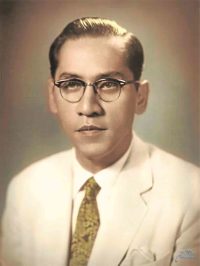This last day of the year no one left the house. There was a summary burning and destruction of the uniforms, caps, and other military accessories belonging to my cousins as former R.O.T.C. students. It was intended to prevent the Japanese from having any lead concerning the military activities of the young male members of the
family.
“It must not be known that you have been cadets in school or that you have received any military training,” one of my aunts explained it to her two sons.
But, my father was quick to point out, “Let us not be too candid. We should not overexert ourselves. The Japanese are not so stupid as to fail to realize that our boys, given their age, must have undergone military training in school, as provided for by law. On the other hand, such training is no crime at all and, therefore, would not call for any punishment on the part of the Japanese.”
Yet, I asked myself, “What if they should construe such military training as service in the regular army, which has waged arms against the Japanese?”
I did not bother to answer my Own question.
In the afternoon the rumor about the imminent entry of the occupation army was so insistently strong that my father yielded to the temptation of seeking to ascertain it personally. We—my uncles, my cousins, and myself—accompanied him. We drove out, therefore, bound for Parañaque, a town some few kilometers from Manila, for it was said that the Japanese troops were already there ready to enter the capital. When we passed in front of the Nippon Club at Taft Avenue Extension, we saw a considerable group of well-dressed Japanese bearing small flags of their country. Aligned along the sidewalk, they exuded a joyful attitude of welcome, no doubt addressed to their victorious forces. Since the eighth of December, they had been confined to internment camps. Now they were free. Who released them? It mattered not. What was undeniable was that today they stood in the streets, freed of any restriction whatever. It was the proof of who had won in the military terrain, even if I would imagine that such was purely transitory. We might have lost the battle, jn regard to Manila, but the war proceeded on and the last word had as yet not been uttered. Even so, I felt a deep pang of sorrow.
In our drive we passed beyond the Pasay border. Halfway we spotted a young man, who with great haste, was walking in the opposite direction. Our car stopped. My father stepped down to talk to him.
“Excuse me,” we heard our father ask, “could you tell us where the Japanese troops are?”
Somewhat breathless, he replied, “They are encamped in Parañaque, making ready to enter Manila.”
Upon thanking him, my father returned to the car. The young man interrupted him, “Forgive me, Sir. Do you intend to go to Parañaque?”
When my father answered him in the affirmative, he added, “Please, don’t do so. I came from that place and, together with some others, I was expelled. They would not have anyone see them. The negotiations for the turnover of the capital are going on and no interruption is allowed.”
We deemed it a timely warning. We, therefore, considered it more prudent to return to the city. When we drove along the Masonic Temple on Taft Avenue, one of my cousins cried out, “Look! A Japanese flag!”
“Where?”
“At the roof of the Philippine Women’s University!”
Indeed, we saw a white and red flag fluttering above. It pained us all.
“Such haste in pleasing the enemy!” bemoaned my father with an unmistakable tone of indignation.
“Possibly it is only a measure of precaution,” suggested one my uncles.
A fortunate gust of wind made the flag display itself more openly. This enabled us to ascertain that it was not a Japanese flag, but the official emblem of the Red Cross, which had the same colors. As the car drove in front of the said university, we discovered an emergency station installed on the ground floor, managed by the said charitable institution.
This last night of the year moved us early to bed. But not long after, our sleep was interrupted by a deafening explosion. Very quickly and with the aid of some flashlights we rushed to the air-raid shelter still half-finished. There was no second explosion, but we heard the drone of some aircraft. In silence, we remained, expectant. Long after, it seemed to us that the planes had left. We stepped out.
Once upstairs, my father told us, “But a few minutes are left for midnight. This incident seems to indicate that we should not retire for the night without first undergoing the traditional rite of welcoming the new year and bidding the old, farewell. What do you think?”
We all acquiesced to his suggestion. Hastily our aunts managed to improvise some repast. It consisted of canned corned beef with some fried potatoes and American bread. Next, we uncorked a bottle of red wine.
My father insisted to toast, “Let us toast for peace, rather than for victory!”
We all did so, even if, personally, I did not think we should be that pessimistic.
Then we exchanged felicitations and good wishes, amidst kisses and embraces and some unavoidable tears. How hollow it all sounded to me!
It was only left to me to say In silence, “Cast thyself into the utmost oblivion, year 1941!”
